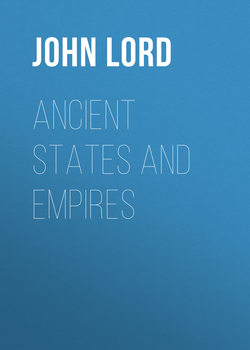Ancient States and Empires

Реклама. ООО «ЛитРес», ИНН: 7719571260.
Оглавление
John Lord. Ancient States and Empires
PREFACE
BOOK I. ANCIENT ORIENTAL NATIONS
CHAPTER I. THE ANTEDILUVIAN WORLD
CHAPTER II. POSTDILUVIAN HISTORY TO THE CALL OF ABRAHAM.—THE PATRIARCHAL CONSTITUTION, AND THE DIVISION OF NATIONS
CHAPTER III. THE HEBREW RACE FROM ABRAHAM TO THE SALE OF JOSEPH
CHAPTER IV. EGYPT AND THE PHARAOHS
CHAPTER V. THE JEWS UNTIL THE CONQUEST OF CANAAN
CHAPTER VI. THE CONQUEST OF CANAAN TO THE ESTABLISHMENT OF THE KINGDOM OF DAVID
CHAPTER VII. THE JEWISH MONARCHY
CHAPTER VIII. THE OLD CHALDEAN AND ASSYRIAN MONARCHIES
CHAPTER IX. THE EMPIRE OF THE MEDES AND PERSIANS
CHAPTER X. ASIA MINOR AND PHŒNICIA
CHAPTER XI. JEWISH HISTORY FROM THE BABYLONIAN CAPTIVITY TO THE BIRTH OF CHRIST.—THE HIGH PRIESTS AND THE ASMONEAN AND IDUMEAN KINGS
CHAPTER XII. THE ROMAN GOVERNORS
BOOK II. THE GRECIAN STATES
CHAPTER XIII. THE GEOGRAPHY OF ANCIENT GREECE AND ITS EARLY INHABITANTS
CHAPTER XIV. THE LEGENDS OF ANCIENT GREECE
CHAPTER XV. THE GRECIAN STATES AND COLONIES TO THE PERSIAN WARS
CHAPTER XVI. GRECIAN CIVILIZATION BEFORE THE PERSIAN WARS
CHAPTER XVII. THE PERSIAN WAR
CHAPTER XVIII. THE AGE OF PERICLES
CHAPTER XIX. THE PELOPONNESIAN WAR
CHAPTER XX. MARCH OF CYRUS AND RETREAT OF THE TEN THOUSAND GREEKS
CHAPTER XXI. THE LACEDÆMONIAN EMPIRE
CHAPTER XXII. THE REPUBLIC OF THEBES
CHAPTER XXIII. DIONYSIUS AND SICILY
CHAPTER XXIV. PHILIP OF MACEDON
CHAPTER XXV. ALEXANDER THE GREAT
BOOK III. THE ROMAN EMPIRE
CHAPTER XXVI. ROME IN ITS INFANCY, UNDER KINGS
CHAPTER XXVII. THE ROMAN REPUBLIC TILL THE INVASION OF THE GAULS
CHAPTER XXVIII. THE CONQUEST OF ITALY
CHAPTER XXIX. THE FIRST PUNIC WAR
CHAPTER XXX. THE SECOND PUNIC OR HANNIBALIC WAR
CHAPTER XXXI. THE MACEDONIAN AND ASIATIC WARS
CHAPTER XXXII. THE THIRD PUNIC WAR
CHAPTER XXXIII. ROMAN CONQUESTS FROM THE FALL OF CARTHAGE TO THE TIMES OF THE GRACCHI
CHAPTER XXXIV. ROMAN CIVILIZATION AT THE CLOSE OF THE THIRD PUNIC WAR, AND THE FALL OF GREECE
CHAPTER XXXV. THE REFORM MOVEMENT OF THE GRACCHI
CHAPTER XXXVI. THE WARS WITH JUGURTHA AND THE CIMBRI.—MARIUS
CHAPTER XXXVII. THE REVOLT OF ITALY, AND THE SOCIAL WAR.—MARIUS AND SULLA
CHAPTER XXXVIII. THE MITHRIDATIC AND CIVIL WARS.—MARIUS AND SULLA
CHAPTER XXXIX. ROME FROM THE DEATH OF SULLA TO THE GREAT CIVIL WARS OF CÆSAR AND POMPEY.—CICERO, POMPEY, AND CÆSAR
CHAPTER XL. THE CIVIL WARS BETWEEN CÆSAR AND POMPEY
CHAPTER XLI. THE CIVIL WARS FOLLOWING THE DEATH OF CÆSAR.—ANTONIUS.—AUGUSTUS
CHAPTER XLII. THE ROMAN EMPIRE ON THE ACCESSION OF AUGUSTUS
CHAPTER XLIII. THE SIX CÆSARS OF THE JULIAN LINE
CHAPTER XLIV. THE CLIMAX OF THE ROMAN EMPIRE
CHAPTER XLV. THE DECLINE OF THE EMPIRE
CHAPTER XLVI. THE FALL OF THE EMPIRE
Отрывок из книги
The history of this world begins, according to the chronology of Archbishop Ussher, which is generally received as convenient rather than probable, in the year 4004 before Christ. In six days God created light and darkness, day and night, the firmament and the continents in the midst of the waters, fruits, grain, and herbs, moon and stars, fowl and fish, living creatures upon the face of the earth, and finally man, with dominion “over the fish of the sea, and the fowls of the air, and cattle, and all the earth, and every creeping thing that creepeth upon the earth.” He created man in his own image, and blessed him with universal dominion. He formed him from the dust of the ground, and breathed into his nostrils the breath of life. On the seventh day, God rested from this vast work of creation, and blessed the seventh day and sanctified it, as we suppose, for a day of solemn observance for all generations.
He there planted a garden eastward in Eden, with every tree pleasant to the sight and good for food, and there placed man to dress and keep it. The original occupation of man, and his destined happiness, were thus centered in agricultural labor.
.....
His son, Amon, followed in the steps of his father, but after a brief reign of two years, was killed by his servants, B.C. 639, and was buried in the sepulchre of his family, in the garden of Uzza.
Then followed the noble reign of Josiah—the last independent king of Judah—whose piety and zeal in destroying idolatry, and great reforms, have made him the most memorable of all the successors of David. He repaired the temple, and utterly destroyed every vestige of idolatry, assisted by the high priest Hilkiah, who seems to have been his prime minister. He kept the great feast of the passover with more grandeur than had ever been known, either in the days of the judges, or of the kings, his ancestors; nor did any king ever equal him in his fidelity to the laws of Moses. But notwithstanding all his piety and zeal, God was not to be turned from chastising Judah for the sins of Manasseh, and the repeated idolatries of his people; and all that Josiah could secure was a promise from the Lord that the calamities of his country should not happen in his day.
.....